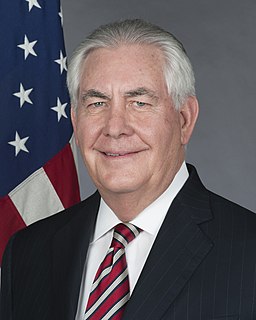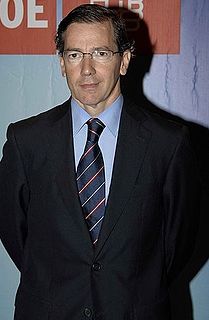A Quote by Melissa Harris-Perry
I am a supporter of much of the Arab Spring, as a matter of indigenous self-determination. So, I see the United States' role in Libya as an appropriately restrained one in providing some international support for the work of those trying to bring democratic change against a regime that has undoubtedly been dictatorial, particularly in the past twenty years.
Quote Topics
Against
Am
Arab
Arab Spring
Been
Bring
Change
Democratic
Determination
In The Past
Indigenous
International
Libya
Matter
Much
Particularly
Past
Providing
Regime
Restrained
Role
See
Self
Self-Determination
Some
Spring
States
Support
Supporter
Those
Trying
Twenty
Undoubtedly
United
United States
Work
Years
Related Quotes
Obviously, the United States' own founding principles are self-determination. And I think what the United States and our allies want to do is to enable the Syrian people to make that determination. You know, we've seen what violent regime change looks like in Libya and - and the kind of chaos that can be unleashed.
I am deeply gladdened that 1993 has been delcared the International Year of Indigenous Peoples by the United Nations. It is the first year we have had in five hundred years. This is thanks to the struggle of many untitled, unnamed indigenous brothers who, without understanding international law, patiently walked the corridors asking for some time. Thanks to them this international year has been declared.
Regime change has been an American policy under the Clinton administration, and it is the current policy. I support the policy. But regime change in and of itself is not sufficient justification for going to war--particularly unilaterally--unless regime change is the only way to disarm Iraq of the weapons of mass destruction pursuant to the United Nations resolution.
Faced with the potential of mass atrocities and a call for help from the Libyan people, the United States and our friends and allies stopped Gadhafi's forces in their tracks. A coalition that included the United States, NATO and Arab nations persevered to protect Libyan civilians. So this is a momentous day in the history of Libya. The dark shadow of tyranny has been lifted, and with this enormous promise the Libyan people now have a great responsibility: to build an inclusive and tolerant and democratic Libya that stands as the ultimate rebuke to Gadhafi's dictatorship.
In the Islamic world, the U.S. is seen in two quite different ways. One view recognizes what an extraordinary country the U.S. is.The other view is of the official United States, the United States of armies and interventions. The United States that in 1953 overthrew the nationalist government of Mossadegh in Iran and brought back the shah. The United States that has been involved first in the Gulf War and then in the tremendously damaging sanctions against Iraqi civilians. The United States that is the supporter of Israel against the Palestinians.
Most Arabs and Muslims feel that the United States hasn't really been paying much attention to their desires. They think it has been pursuing its policies for its own sake and not according to many of the principles that it claims are its own - democracy, self-determination, freedom of speech, freedom of assembly, international law.
In the area of international security, taking into account that the United States and Russia are the largest nuclear powers: We are ready to jointly work to strengthen the non-proliferation regime for weapons of mass destruction and their means of delivery. We are ready to work together, and much closer than before, on the problem of fighting terrorism, international terrorism, and here we certainly have vast opportunities.
Iran did not talk to the United States for 35 years. And now we are talking. And I believe these talks are useful. But they haven't produced the intended results. We have not seen an end to the hostility that has been exhibited in the United States against Iran. And I believe it is important that we see some of that.




































